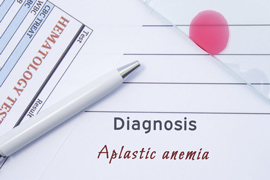Severe Aplastic Anemia and Myelodysplastic Syndrome

Treatment of severe aplastic anemia (SAA) and myelodysplastic syndrome (MDS) usually involves a bone marrow transplant. Researchers at the National Institutes of Health are testing ways to make transplant using unrelated donor cells from umbilical cord blood safer and more effective.
Most patients with SAA or MDS lack a tissue-matched donor for a standard allogeneic stem cell transplant. For them, an umbilical cord blood transplant is a reasonable alternative. In this study, we will be obtaining stem cells from cord blood using a new type of separating machine and a procedure for expanding (multiplying) the stem cells in a laboratory. We hope these procedures will reduce post-transplant complications and improve transplant outcomes.
You May Be Eligible if
- You are 4-55 years old and diagnosed with SAA or MDS
- Other treatments have already failed, are not available, or are not likely to cure your disease
- You are not currently pregnant and will avoid pregnancy while in the study
- You do not have a potential stem cell donor who is a tissue (HLA) match
There is no charge for medications, tests, and procedures that are performed as part of this study. Some transportation and lodging may be reimbursed for enrolled participants. Self-referrals are welcome.
Location
The NIH Clinical Center, America's Research Hospital, is located in Bethesda, MD, on the Metro red line (Medical Center stop).
For More Information
NIH Clinical Center Office of Patient Recruitment
1-800-411-1222 (refer to study 17-H-0091)
Email: ccopr@nih.gov
(TTY users dial 7-1-1)
Se habla español
Or go online
Department of Health and Human Services
National Institutes of Health Clinical Center
National Heart, Lung and Blood Institute

